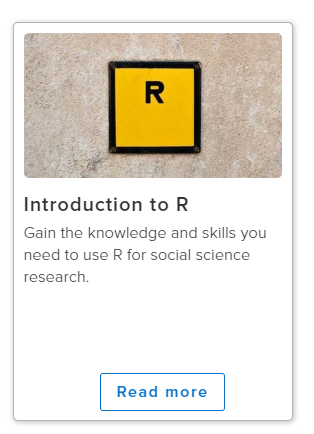The University of Mannheim case study
As the world becomes increasingly digitized, there is an increasing demand for big data literacy in research and practitioner positions. The International Program in Survey and Data Science (IPSDS), offered through the University of Mannheim and the Joint Program in Survey Methodology at the University of Maryland, aims to equip professionals working with data with such skills.
Earlier this year Dr. Florian Keusch, Professor of Statistics and Methodology at the University of Mannheim, used SAGE Campus’ Introduction to R online course to prepare students for IPSDS classes. We spoke to Florian about why they used the course and their experience with SAGE Campus.
The challenge: Students didn’t have the required R skills
“We use the R programming language and RStudio in many of the classes, but no introductory programming class is offered as part of IPSDS”, says Florian, who likes R’s countless packages and ability to handle different types of data.
“IPSDS courses cover intermediate and advanced data science and the original expectation was that students would either have R skills already, or would catch up in their own time using free resources”.
IPSDS is fully online and taught in a flipped classroom approach with limited online meetings and students have a very diverse background, so, Florian explains; “it isn’t feasible for faculty members to spend the first weeks in each class teaching intro-level programming skills”.
However, Florian found that some free resources were poor quality, or didn’t give practical skills that could be applied to the materials taught in IPSDS, so some students still struggled with the R requirements of classes. As a result, students differed in their knowledge and abilities in R - which made teaching tricky.
Florian needed an efficient and effective way of upskilling students from different countries and with different backgrounds in R, in order for them to be prepared for class requirements.
The solution: SAGE Campus’ Introduction to R online course
The level of our Introduction to R online course and the trusted SAGE quality were two aspects that attracted Florian to SAGE Campus. The course was offered to all IPSDS students as an optional preparatory course to take before or during the program.
The Campus course is self-paced and chunked into manageable modules, meaning students could fit it around busy schedules. Additionally, the guiding videos of an expert instructor throughout the course meant students with no prior knowledge of R could work through modules sequentially, while those who simply wanted a refresher could dip in and out.
Furthermore, students could access the course directly from the University of Maryland’s Learning Management System, Canvas, alongside their other course resources - requiring little to no support from IT, Florian, or other instructors.
The outcome: Supported student success on the IPSDS
All 23 students who took Campus’ Introduction to R course reported that they felt ‘motivated’ or ‘highly motivated’ to complete it. A huge 74% completed all modules of the course - with 65% completing every single module and activity. This, Florian noted, is a much higher retention rate than what we know from MOOCs.
Florian found the level of Introduction to R ideal; it suited students who had no prior experience in R while students who already knew R still found the course helpful. In fact, 92% of the students said it taught them skills or knowledge they can use in their research.
The real value of the course, however, was revealed in how students performed in IPSDS classes after completing the course. Students really appreciated the head-start they got from the Introduction to R class before joining the substantive IPSDS courses that used R as a programming language and for data analysis. This also makes it easier for instructors to focus on the content of the course and not spend too much time with teaching the basics of R. “I have heard both from our students and the IPSDS faculty that the transition into working with data and actual use cases was much faster this summer than in the past,” Florian said.
Student feedback: All would like access to SAGE Campus in the future
The feedback from students was overwhelmingly positive. 92% rated the overall quality of the course as “very good” and said they’d recommend the course to others.
Another student comments; “it was the first online course I ever took and I was extremely pleasantly surprised at how motivating (due to the small chunks of content with specification on length), professional, and personal (because of the online tutor videos) the course was”.
Overall, every student who took the course noted that they would like their institution to make other SAGE Campus courses available to them in the future.
Find out more about the course: Introduction to R for Social Scientists
If you’re teaching a class in R or Python and are interested in using SAGE Campus at your institution, check out the following page.




